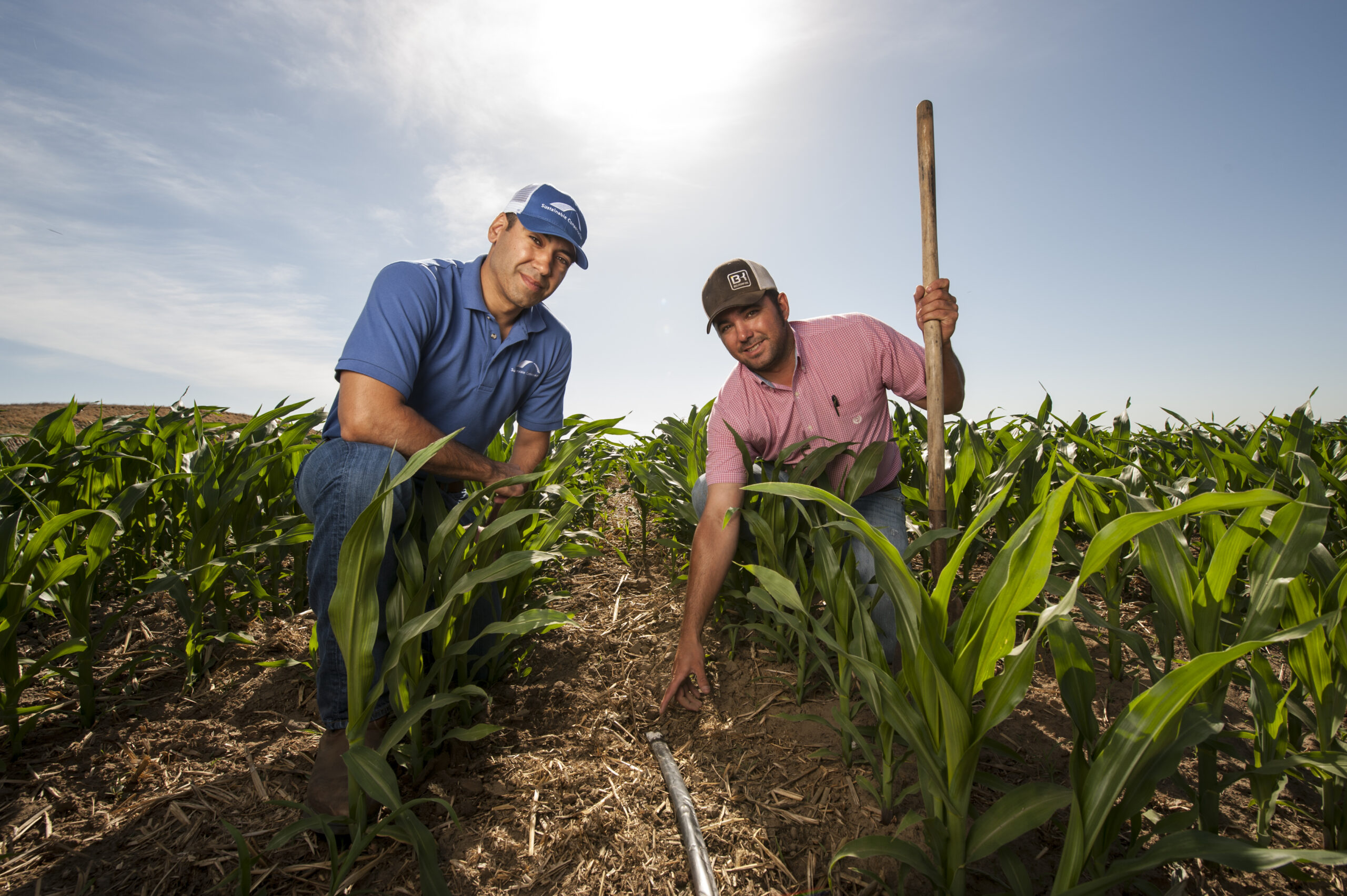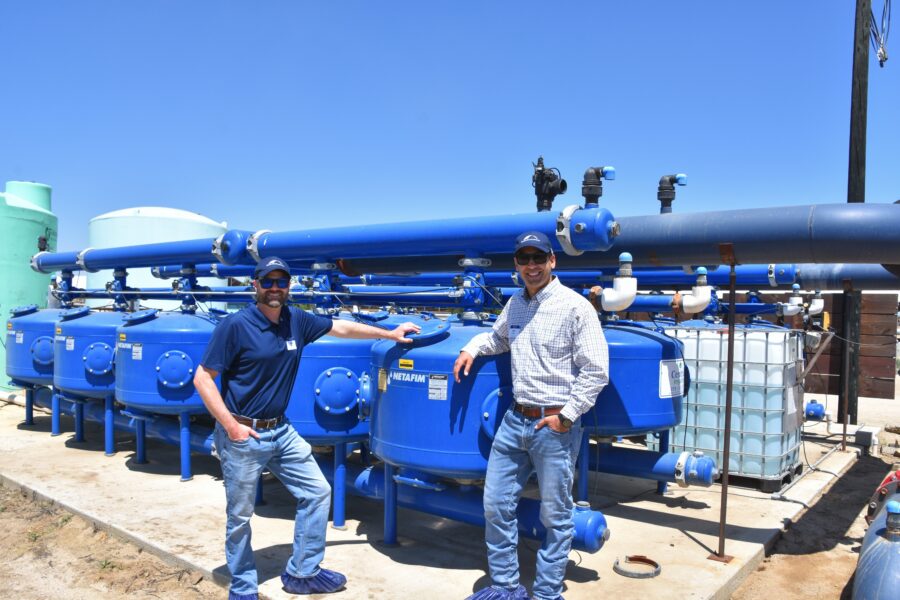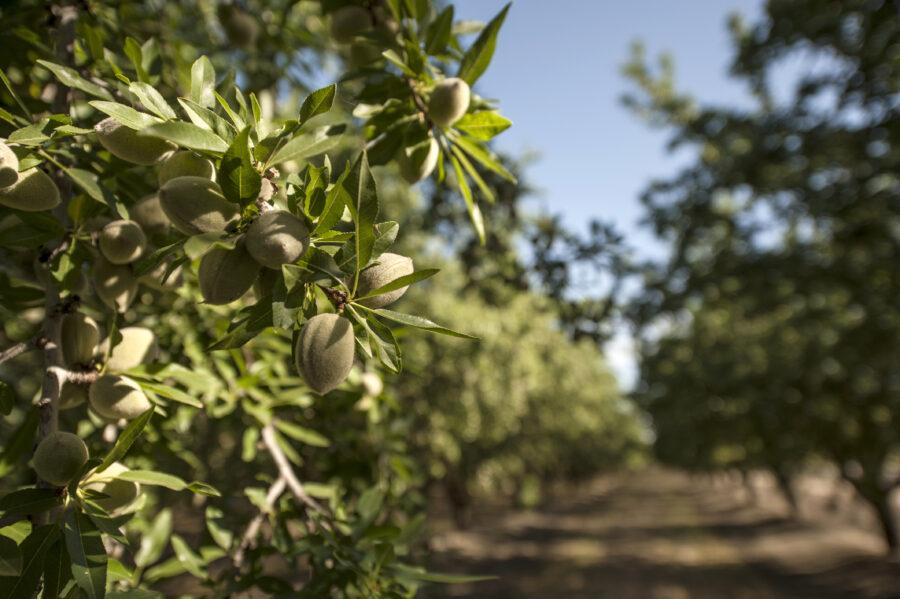
Sustainable Conservation Project Director John Cardoza (left) poses with De Jager Dairy CEO Nate Ray on a feed crop field irrigated by SDI-E. Paolo Vescia
Modesto, CA — August 20, 2024 — Sustainable Conservation, in partnership with Netafim USA, is excited to announce the award of a Conservation Innovation Grant (CIG) from the Natural Resources Conservation Service (NRCS). This grant will fund a first-of-its-kind pilot project at De Jager Dairy, where the award-winning Subsurface Drip Irrigation for Dairy Effluent (SDI-E) system will be adapted to irrigate and fertilize almond crops.
Dairy farms are integral to California’s agricultural economy, but the 1.72 million dairy cows in California generate manure that can be a major source of nitrate pollution and methane emissions. With over 600,000 residents reliant on contaminated wells for household water in the San Joaquin Valley alone, we must manage manure in ways that unlock its nutrient-rich potential and protect our water quality.
The SDI-E system blends carefully ratioed cow manure and water to fertigate dairy feed crops in lieu of traditional flood irrigation. By delivering this effluent blend directly to crop root zones, the SDI-E system conserves water, reduces methane emissions, and prevents groundwater contamination from nitrate overapplication. This innovative system, developed under a CIG in 2016, now saves over 2.3 billion gallons of water and 2.4 million pounds of nitrogen pollution annually across 4,432 acres of feed crops in California.

Expanding SDI-E’s Reach
The new demonstration project will focus on applying the SDI-E system to almond crops at De Jager Farms, an early adopter of SDI-E. The pilot will rigorously adhere to strict food safety standards, with careful monitoring and testing to ensure that the system delivers safe, high-quality almonds.
Food safety is our largest priority as we look to extend SDI-E technology to human-consumed crops, and the potential impact is enormous. If we can successfully fertilize and irrigate almonds with SDI-E, the system will help dairies export the excess manure their cows produce as valuable fertilizer, and one step closer to a circular economy in agriculture.
Scaling SDI-E beyond dairies will not only help farmers save on water and synthetic fertilizer usage, but also further mitigate the Valley-wide manure nitrogen surplus by allowing manure to be safely and precisely applied to more acres and crops.

Sustainable Conservation Senior Director of Circular Economies Ryan Flaherty (left) and Cardoza with Netafim USA’s SDI-E irrigation tanks
A Ground-Up Solution
When developing the SDI-E system with Netafim, we listened to growers and let their needs lead the solution-finding process. This farmer-centric approach ensures that the technology aligns with the agricultural community’s practical realities and challenges, and this ethos guides the next chapter of SDI-E. Sustainable Conservation is dedicated to uplifting SDI-E as a solution that offers farmers both environmental and economic benefits, and empowers Central Valley agriculture to be part of environmental solutions in an ever-changing climate and water landscape.
Testimonials
“As a farmer committed to both productivity and sustainability, I’m excited to be part of this innovative project that combines irrigation technology with the practical needs of agriculture,” said Nate Ray, CEO of De Jager Farms. “The Dairy Manure Subsurface Drip Irrigation system has already proven its value in improving water use efficiency and nutrient management on our dairy crops, and I’m eager to see how it can be adapted to benefit our almond crops. This project represents a promising step toward increased sustainable farming practices that protect our natural resources while supporting the long-term success of California agriculture.”
“We continue to champion SDI as a solution for agriculture in the Central Valley — due to its economic and environmental sustainability,” said Ashley Boren, Sustainable Conservation CEO. “This pilot project is a critical step in maximizing the potential impact of the system while helping farmers adapt to a changing climate and precipitation patterns.”
“Orbia’s Precision Agriculture Business (Netafim) is excited to partner with Sustainable Conservation on this innovative project,” said Mike Hemman, President, Netafim North America. “The SDI-E system has already proven its value in conserving water and nutrients on dairy farms, and we are eager to explore its potential for broader agricultural applications.”
“We are thrilled to take this next step in expanding the Subsurface Drip Irrigation system to almond crops,” said John Cardoza, Sustainable Conservation Project Director. “This project exemplifies our commitment to practical, farmer-driven solutions that not only address critical environmental challenges like water conservation and nutrient management but also support the long-term viability of California agriculture. By adapting this innovative technology for almonds, we are moving closer to a more sustainable and resilient agricultural future in California.”

Almond orchard in Manteca, CA. Paolo Vescia
About Sustainable Conservation
For over 25 years, Sustainable Conservation has united people across business, agriculture, and government to steward California’s vital natural resources. Our programs promote practical solutions that enhance environmental and economic sustainability, focusing on water, land, and air quality. For more information, visit www.suscon.org and follow us on Twitter, LinkedIn, Facebook, Instagram, and YouTube.
About Netafim USA
Netafim USA, a leader in drip and micro-irrigation technology, is committed to creating sustainable agricultural irrigation systems that help to save water and don’t require environmentally damaging manufacturing methods. Netafim systems deliver precise water and nutrient management, enabling farmers to optimize crop yields while conserving resources. For more information, visit www.netafimusa.com.
Media Contacts:
Eric Epstein
Communications Associate, Sustainable Conservation
Aubrey Bettencourt
Global Director of Government Relations and External Affairs, Netafim USA
